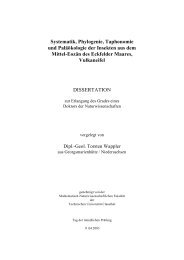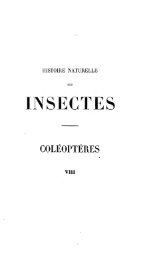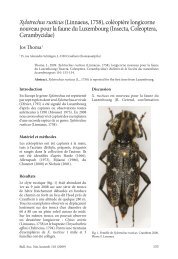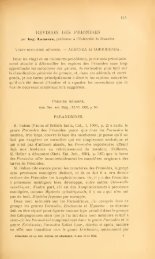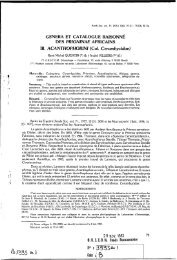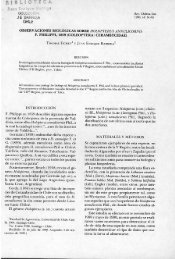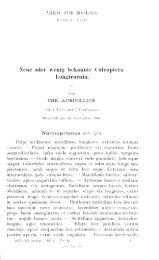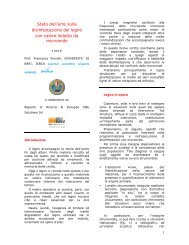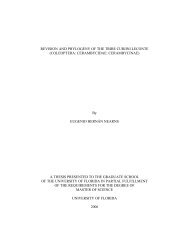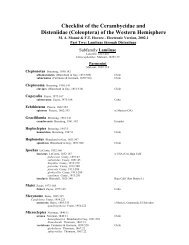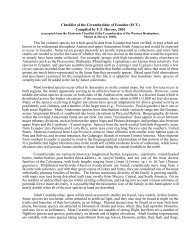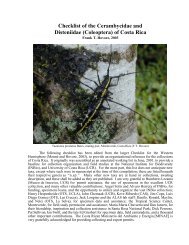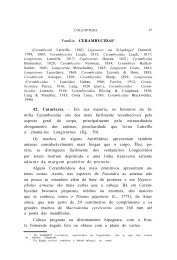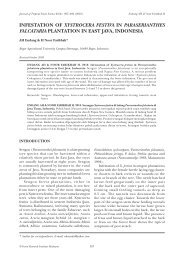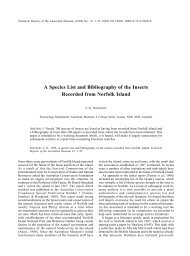Crustacea: Copepoda - Cerambycoidea.com
Crustacea: Copepoda - Cerambycoidea.com
Crustacea: Copepoda - Cerambycoidea.com
Create successful ePaper yourself
Turn your PDF publications into a flip-book with our unique Google optimized e-Paper software.
Xylita laevigata (Hellenius) - Nationally Scarce A. Within decaying wood; Scottish<br />
Highlands.<br />
Hypulus quercinus (Quensel) - RDB2. In decaying heartwood of oak Quercus, hazel Corylus<br />
and birch Betula. Relict old forest species; mostly eastern and southeastern England,<br />
as far north as Yorkshire; also Avon Gorge, S. Devon & S. Wales.<br />
Zilora ferruginea (Paykull) - Nationally Scarce B. In Hirschioporus abietinus on dead pine<br />
Pinus; pupae under bark on deadwood; Highlands.<br />
Melandrya barbata (Fabricius) - RDB1. In decaying wood of oak Quercus and beech Fagus.<br />
Only known in Britain from a very few ancient wood pasture areas of south-east<br />
England.<br />
Melandrya caraboides (Linnaeus)* - Nationally Scarce B. Develops in relatively soft moist<br />
white-rotted heartwood of boughs, trunks and stumps; various broad-leaved trees,<br />
especially ash Fraxinus and beech Fagus. Widespread in England and Wales, but<br />
rare in Scotland and Ireland; mostly associated with ancient woodlands and wood<br />
pastures, including linear sites such as riverside trees.<br />
Conopalpus testaceus (Olivier)* - Nationally Scarce B. Develops in decaying boughs and<br />
branches, especially of oak Quercus, also hazel Corylus; adults may visit flowers,<br />
especially umbellifers. Associated with ancient wood pastures; widespread in central<br />
and southeastern England, rare in west; Dyfed.<br />
Osphya bipunctata (Fabricius) - RDB3. Adults attracted to hawthorn Crataegus blossom,<br />
also wayfaring and guelder rose Viburnum, and field maple Acer campestre; larval<br />
habitat not known. Concentrated on Huntingdonshire, and extending sparingly in<br />
broad spread southwards as far as N. Somerset and E. Suffolk.<br />
Mordellidae - Tumbling Flower Beetles. The larvae of most genera in this family develop<br />
in galls or the stems of herbaceous plants, but a few specialise in decaying wood.<br />
Variimorda villosa (Shrank) is probably a stem species although has often been<br />
assumed to be a wood-decay species.<br />
Tomoxia bucephala (Gyllenhal) - Nationally Scarce A. Adults lay eggs in vacated anobiid<br />
borings in exposed heartwood on standing trunks; larvae develop in decayed timber;<br />
beech Fagus, horse chestnut Aesculus & other broad-leaved trees; adults visit umbel<br />
flowers. Confined to relict old forest areas of the southern- and eastern-most counties<br />
of England.<br />
Mordellochroa abdominalis (Fabricius) - Develops in dry sapwood of dead broad-leaved<br />
trees, including ash Fraxinus. Adults locally frequent at flowers of hawthorn<br />
Crataegus, hogweed Heracleum, etc.<br />
Mordellistena humeralis (Linnaeus) – RDBK. Adults have been found at blossom of umbels<br />
and meadowsweet Filipendula. A few confirmed records only, from the southeast and<br />
East Anglia.<br />
Mordellistena neuwaldeggiana (Panzer)* - RDBK. Has been reared from hornbeam<br />
Carpinus and field maple Acer campestre branch wood in early stages of decay;<br />
adults attracted to blossom. Restricted range in south and east of England, with most<br />
records from relict old forest or wood pasture.<br />
Rhipiphoridae<br />
Metoecus paradoxus (Linnaeus)* - Eggs deposited on wood, and larvae transported by wasps<br />
collecting wood pulp for nest materials into nests as triungulin larvae; larvae feed on<br />
wasp larvae, initially endoparasites, later ectoparasites; very quick growing, possibly<br />
a few days only; wasp nests in ground most usually, seldom in elevated situations<br />
such as buildings; host always the wasp V. vulgaris.<br />
58



